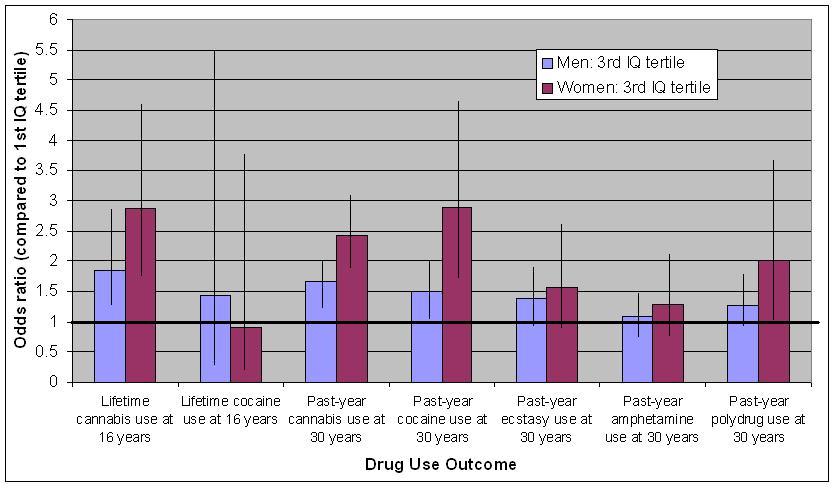Children who score relatively high on intelligence tests become relatively healthy adults, in some important respects. For instance, White and Batty (2011) noted that they are less likely to smoke, more likely to engage in physical activity, and more likely to eat healthy foods than their peers. However, research is equivocal regarding a link between childhood IQ scores and adult use of illegal drugs (as reviewed by White & Batty, 2011). In this week’s STASH, we review a recent longitudinal, population-based study investigating the connection between childhood IQ and adult use of illegal drugs (White & Batty, 2011).
Methods
- The authors used data from the 1970 British Cohort Study, an ongoing longitudinal study of children born in Great Britain during April, 1970.

- The children in the study were enrolled at birth and were invited to participate at ages 5, 10, 16, 26, and 29-30.
- At age 5, participants completed four tests purported to measure general cognitive ability (e.g., the Human Figure Drawing test, shown at right). The researchers transformed scores to the standard IQ distribution (mean = 100, SD = 15). Also at these assessments, the researchers made note of parents’ social class.
- At age 16, participants indicated their lifetime use of cannabis and cocaine (yes/no).
- At age 30, participants indicated their past-year use of several illegal drugs (yes/no).
- The researchers completed logistic regression to estimate the relation between childhood IQ and participant gender with illegal drug use at ages 16 and 30. They modeled childhood IQ as tertiles, with the lowest IQ group as the reference group. Positive odds ratios therefore indicate that a higher risk of illegal drug use is associated with moderate or high childhood IQ.1 In the results presented here, researchers statistically controlled for parental social class at age 5.
Results
- The researchers present drug use outcomes separately for men and women at both 16 and 30 years.2
- The strongest effects emerged from comparisons between the highest childhood IQ tertile and to the lowest IQ tertile. Figure 1 illustrates only these comparisons.3
- Male and female participants with relatively high childhood IQ were more likely to report having used cannabis but not cocaine at age 16.
- Male participants with relatively high childhood IQ were more likely to report past-year use of cannabis and cocaine at age 30.
- Female participants with relatively high childhood IQ were more likely to report past-year polydrug use and use of cannabis and cocaine at age 30.
- Associations between childhood IQ and adult illegal drug use were stronger for women than for men.

Figure. Odds ratios and 95% confidence intervals for illegal drug use outcomes at 16 and 30 years, separately for men and women. Adapted from White and Batty, 2011. Click to enlarge.
Limitations
- Participants did not report important features of their drug use, such as frequency, quantity, and consequences. Accordingly, these results do not speak to the potential association between childhood IQ and substance use disorders (e.g., dependence, abuse).
- As with most longitudinal studies, this research was marked by some attrition. For instance, only 46% of the participants at the 30-year follow-up completed all earlier surveys. Indeed, participants who completed the 30-year follow-up had slightly higher childhood IQ scores than participants who did not. It is unclear how this selective attrition might have influenced observed relationships between childhood IQ and adult drug use.
Conclusion
In this large, population-based cohort study, the authors observed a consistent pattern: higher childhood IQ predicted greater likelihood of illegal drug use during adulthood, independent of parental social class. The authors speculate about a potential pathway involving personality. According to this reasoning, high IQ individuals use drugs because they are characterized by traits linked with drug use, such as stimulation seeking and openness to experience. The presence of stronger associations for women than men requires further exploration, as does the potential association between childhood IQ and adult substance dependence and abuse.
-Heather Gray
What do you think? Please use the comment link below to provide feedback on this article.
Reference
White, J., & Batty, G. D. (2011). Intelligence across childhood in relation to illegal drug use in adulthood: 1970 British Cohort Study. Journal of Epidemiology and Community Health, Online first: November 14, 2011.
[1] Preliminary analyses suggested that modeling IQ as a linear term was inappropriate.
[2] The interaction term between childhood IQ and participant gender for drug use outcomes was significant at 30 years but not at 16 years.
[3] Comparisons between the moderate IQ tertile and the lowest IQ tertile were generally in the same direction. Readers interested in more details can see White and Batty (2011).




